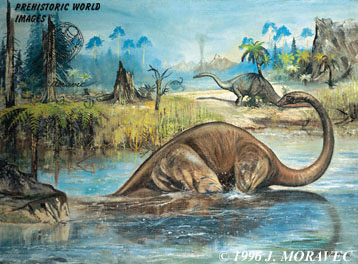|
|
|
DIPLODOCUS
carnegii |
|

|
|
Oil
painting : 28" x 21" |
|
|
DIPLODOCUS
carnegii
Diplodocus was one of the largest dinosaurs ever discovered. It was
the longest land animal, but not the heaviest. It was a sauropod, a
"lizard-hipped" dinosaur. Diplodocus carnegii was named after industrialist
and philanthropist Andrew Carnegie. This sauropod was the most famous
dinosaur on the planet in the last century. There is a famous life-size
replica of the Diplodocus nicknamed "Dippy" in front of the Carnegie Museum
of National History (Pittsburgh, PA, USA). Diplodocus was a herbivore, it ate only plants; main food was probably
conifers. It must have eaten an enormous amount of plants each day. It
didn't chew them, it swallowed leaves whole. It swallowed also stones
(gastroliths), which it held in its stomach. They helped by digesting tough
plant material. Diplodocus may have traveled in herds, migrating when the
food supply was depleted. It probably bred from eggs, like other sauropods.
It is thought, that the eggs were laid as the dinosaur was walking.
This sauropod was a huge creature with an extremely long neck and a long, whip-like tail. Most of this herbivorous animals length was in the
neck and tail. Diplodocus had an elongated snout with nostrils on top of the
head and simple peg like teeth for stripping soft foliage. It had one of the
smallest brains (the size of fist), its intelligence was among the lowest of
the dinosaurs.
The name Diplodocus means "double beam" and describes a special feature of the backbone. It had slender limbs and hind legs, longer than the
front legs; it gave him access to both low and high growing plants. It was a
quadrupedal, it moved slowly on four column-like legs. All legs had
five-toed (like elephant); one toe on each foot had a thumb claw, probably
for protection.
TIME
- 150MYA, Late Jurassic period.
RANGE
- USA Colorado, Montana, Utah and Wyoming.
SIZE
- Averaged 88ft (27m).
WEIGHT
- 11 US tons. |
|
|

